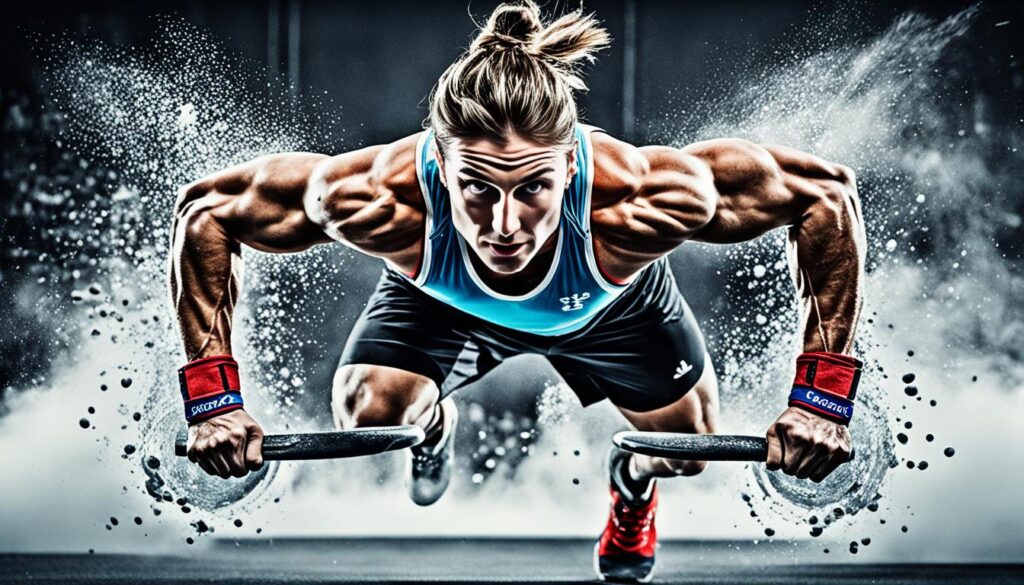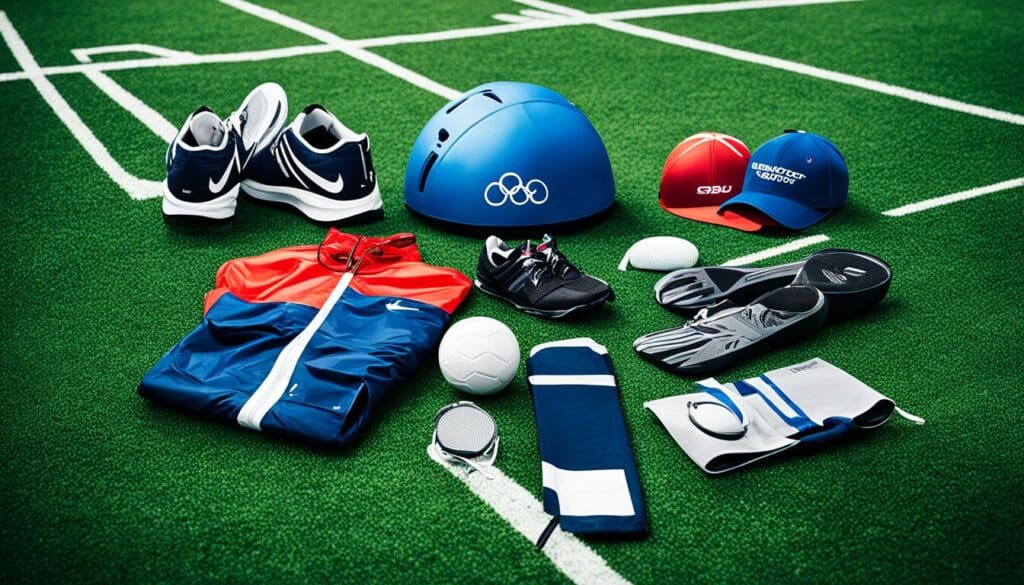How Do Athletes Prepare For Olympic Sports? How Do Athletes Prepare For The journey to the Olympics is tough and long. It takes a lot of hard work, love for the game, and a wide variety of ways to train and get ready. The average Olympic athlete begins their journey at 11, and it takes about 14 years to become an Olympian, says a study by the United States Olympic Committee.
Key Takeaways
- The path to becoming an Olympic athlete often begins at a young age, with many Olympians starting their sport as early as 4 or 5 years old.
- Underlying the incredible dedication and sacrifice required to become an Olympic athlete is a deep-seated passion for their sport and the thrill of competition.
- One of the key factors in the development of many Olympic athletes is their embrace of a multisport approach during their formative years.
- The guidance and support of an experienced and effective coach are essential elements in the journey of an Olympic athlete.
- Becoming an Olympic athlete requires an extremely rigorous and dedicated training regimen, with the average Olympian training six days a week.
Starting Early With Olympic Dreams
Olympic athletes often start early, some as young as 4 or 5, especially if their sport is tough like gymnastics. A study named “Pathway to Excellence” tells us most Olympians began their journey at 11.4 years. They first stood out in local competitions by the time they were 14.2.
Introducing the Sport at a Young Age
Young kids get into Olympic sports early, sometimes even before they go to school. This early start teaches them important skills like discipline and dedication. These are needed to be great at sports like gymnastics, swimming, or the 32 sports in the Olympic Games.
Starting young helps begin the long journey to the Olympic podium. The sport becomes a part of their life very early, setting them on a path to success.
Achieving Local Competitive Success
As they get older, Olympic hopefuls compete in local contests. These first competitions help them improve their skills and grow in confidence. Success locally at around 14.2 years can lead to bigger opportunities.
The “Pathway to Excellence” study found that this is a crucial time. It’s when Olympians typically start to distinguish themselves in competitions.
Realizing and Pursuing the Olympic Dream
Many Olympic dreams start in teenage years. The “Pathway to Excellence” study tells us that, on average, Olympians first dream of it at 14.0 years old. This dream, combined with their upbringing in the sport and early successes prepares them for a future in the Olympics.
Developing a Strong Passion for the Sport

To become an Olympic athlete, it takes a lot of hard work, time, and giving up some things. But at the heart of it is a real love for the sport and the competition it brings. A study called “Pathway to Excellence” found that what pushes Olympians is their deep love for the sport and competition. They also have a big desire to succeed and find true joy in their sport.
Intrinsic Love of Activity and Competition
Olympic hopefuls are driven by the challenge and thrill of competing. They aim to match their skills with the best in the world. This is because they truly enjoy their Olympic sport. Their passion is not just for winning awards but for the love of the sport itself.
Deriving Fun and Desire for Success
For Olympic athletes, their sport is not just a competitive outlet. It’s where they find fun and joy. This internal drive to succeed makes them work hard and be better at what they do. They dream of Olympic success and see it as a way to show their love for their country. It’s what motivates them to keep improving and aiming for the top.
Embracing a Multisport Approach

Olympic athletes often start learning sports early and try different ones. The “Pathway to Excellence” study showed that 88% of Olympians believe playing multiple sports helped them reach the Olympic Games.
Unstructured Play and Recreational Sports
Olympic athletes say simple play and fun sports as kids were key. They think learning different sports made them all-around better. This approach helps in becoming great at a specific Olympic sport.
Importance of Playing Multiple Sports
Playing different sports has many upsides for young athletes. It boosts coordination, quickness, and smart decision-making. These are all big parts of being an Olympic level athlete. It also stops them from getting tired of just one sport and helps them stay happy working toward the Olympic Games.
| Sport | Number of Olympic Appearances |
|---|---|
| Gymnastics | 26 |
| Athletics | 28 |
| Swimming | 29 |
| Cycling | 25 |
| Rowing | 23 |
Finding the Right Coach and Guidance
Having a skilled and supportive coach is vital for olympic athletes. Research shows that top olympians highly value their coach’s teaching, motivation skills, and deep sport knowledge.
Desired Coaching Traits for Olympic Athletes
For olympic hopefuls, it’s important their coach is a great teacher and motivator. They also need to understand the sport deeply. These qualities are key for olympians to reach their peak performance and handle the intense competition at the olympics.
Ability to Motivate and Encourage
Technical skills are not enough for olympic coaches. They must also inspire their athletes, especially during tough times. Studies show the value of a coach who creates a positive, supportive atmosphere to boost an athlete’s motivation and desire to win.
| Desired Coaching Traits | Importance to Olympic Athletes |
|---|---|
| Teaching Ability | Crucial in developing technical proficiency and tactical understanding |
| Ability to Motivate and Encourage | Essential for maintaining an athlete’s drive and resilience during challenging times |
| In-depth Training and Strategic Knowledge | Vital for optimizing an athlete’s preparation and performance on the olympic stage |
Rigorous Training Regimen
To become an Olympic athlete, you need a tough and dedicated training plan. A study called the “Pathway to Excellence” revealed the average Olympian trains six days a week. They focus intensely for a few hours each day.
Training Six Days a Week
Olympic athletes commit to a hard training routine. They start before sunrise and keep going until late. This hard work and dedication are key parts of their success.
They work hard to test their limits both physically and mentally. This is how they become champions in their sports.
Combining Sport-Specific and Cross-Training
For their training, Olympians use lots of cross-training alongside their sport’s main drills. Cross-training makes them all-around better athletes. It also helps prevent injuries.
Between sport-specific workouts, they do things like strength training, plyometrics, and long-distance runs. This mix of training methods helps them perform at their best. It’s how they get to the top of their sports.
Read Also: Are You Wondering How To Boost Your Immunity?
Embracing Mental Preparation
To make it to the Olympics, athletes don’t just train their bodies hard. They also focus on their mental game. The “Benefits of Mental Preparation For Athletes” source points out how key it is to have mind and body work together. This harmony boosts their performance.
Benefits of Mental Training for Athletes
Mental workouts give Olympic athletes a big edge. These include boosting confidence, focus, and beating the fear of not doing well. Athletes get better at dealing with stress, stay calm in tough spots, and keep a positive mindset all the way through their tough schedules.
Developing a Mental Training Program
The best Olympians use mental training plans. They work with experts like sports psychologists and mental coaches. This helps build their mental strength and perform their best. Their programs might cover visualizing success, setting goals, and tips to handle stress and distractions. All these give them a push towards their Olympic dreams.
| Mental Skill | Description | Benefit to Olympic Athletes |
|---|---|---|
| Confidence | Belief in one’s abilities and the conviction to succeed | Helps athletes perform at their best, even under immense pressure |
| Focus | The ability to concentrate solely on the task at hand | Enables athletes to stay present and eliminate distractions during competition |
| Fear of Failure | The anxiety and apprehension about not meeting expectations | Teaches athletes to reframe failure as an opportunity for growth and improvement |
Qualifying for the Olympic Sports
Earning a place on an Olympic team is hard work. Athletes need to understand many rules. These rules come from the International Olympic Committee (IOC) and their sports’ groups. Knowing these guidelines well is key for any young athlete aiming for the Olympics.
Understanding Qualification Requirements
The way athletes qualify for the Olympics differs by sport. For instance, sports like athletics and swimming have a points-based system. This system requires athletes to reach certain performance levels. But, sports like basketball and soccer decide team spots based on their countries’ international rankings. It’s crucial for athletes to know how their sport qualifies, to stand a chance at the Olympics.
Participating in Qualifying Competitions
To qualify for the Olympics, athletes must not only meet standards but also do well in key events. These events can be continental championships, world cups, or Olympic trials. The stakes are high in these competitions. A mistake can mean missing the Olympic team. Athletes must show they can handle pressure well, a skill that sets the best apart.
FAQs
Q: What are the new sports added to the 2024 Summer Olympics?
A: The sports added to the 2024 Summer Olympics include skateboarding, sport climbing, and surfing.
Q: How do athletes prepare for the Olympic Games?
A: Athletes preparing for the Olympic Games undergo rigorous training programs, work with coaches and nutritionists, and participate in qualifying competitions to earn a spot on their national Olympic team.
Q: What is the significance of the International Olympic Committee in the Olympics?
A: The International Olympic Committee (IOC) is the governing body of the Olympic Games, responsible for overseeing the planning, organization, and execution of the event.
Q: Can you explain the difference between Summer and Winter Olympics?
A: Summer Olympics feature warm-weather sports like swimming and athletics, while Winter Olympics focus on cold-weather sports such as skiing and ice hockey.
Q: How many sports are included in the 2024 Paris Olympics?
A: The 2024 Paris Olympics will feature a total of 32 sports, including both traditional and new sports.
Q: Are there any new sports being introduced in the 2024 Olympic program?
A: Yes, the 2024 Olympics will introduce new sports like breakdancing, sport climbing, skateboarding, and surfing to the program.
Q: Will the 2024 Summer Olympics include any demonstration sports?
A: The 2024 Summer Olympics are not set to include any demonstration sports, focusing solely on official events.
Q: Which sports have been added to the list of Olympic disciplines for 2024?
A: In 2024, new sports like skateboarding, sport climbing, surfing, and breakdancing have been added to the list of Olympic disciplines.





